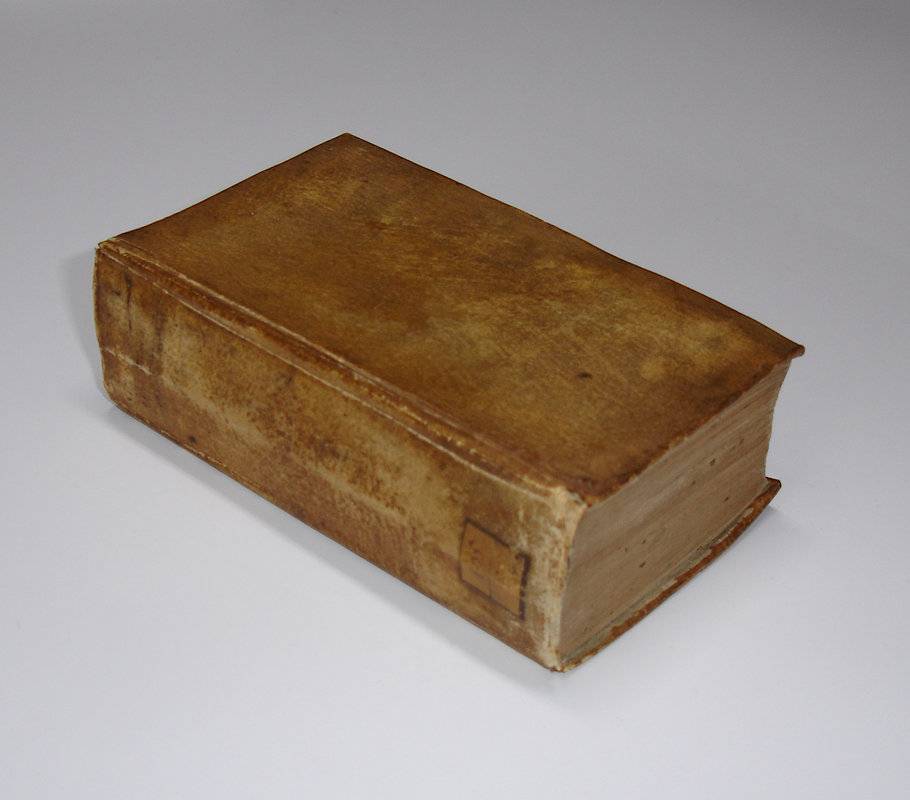ERASMUS.
Des. Erasmi Roterod. Apophthegmatum, ex optimis utriusque linguae scriptoribus collectorum libri octo. Editio novissima, a multis, quibus antea scatebat mendis diligenter repurgata.
Amsterdam (Amstelodami), Apud Joannem Ravesteinium, Civitatis & Illustris Scholae Typographum Ordinarium, 1671.
12mo. (XXIV),642,(19 index sententiarum),(1 blank) Vellum 14 cm (
Details: The engraved frontispiece depicts Erasmus while writing a book; a woman with a laurel wreath in her hair stands in front of him, she holds a mirror. Woodcut printer's device on the title, depicting the prophet Elijah resting against a tree and being fed by ravens. This scene is described in the Old Testament in book 1 Kings, ch.17, vss.1-4, where the Septuagint speaks of 'korakes', ravens that feed Elijah. This is of course an allusion to the printer's name Ravenstein. The entrepreneur's motto is
Exspectando, i.e.
in expectancy) (
Condition: Vellum soiled; foot of the spine somewhat chafed. Rear inner hinge broken, front hinge weak. Old paper shelf label on the back. Small bookplate on the front pastedown. Name on the front flyleaf. An old engraving of a sailing ship pasted on the rear pastedown) (
Note: The famous Dutch humanist scholar and philosopher Desiderius Erasmus, 1466-1536, published towards the end of his life, in 1531, a collection of
Apophthegmata, a kind of thesaurus of sayings or '
illa quidem scitu dignissima, quae philosophi de moribus, de Republica administranda, deque bello gerendo litteris prodiderunt.' (Preface p. *3 verso) He compiled it, he tells us, to further the education of young prince William (Principi Juniori Guilielmo), duke of Cleve. Erasmus confesses that he knows very well that the writers of his own time also produce
salse lepideque dicta, but, he says,
plus habent auctoritatis quae consecravit antiquitas. (Ibidem p. *7 verso) Erasmus strongly believed in the educational worth of prudent, grave and humorous aphorisms and anecdotes. On several places in his paedagogic works Erasmus recommends these kind of sayings for reading, learning, memorizing and the development of style. He stresses the importance of confronting future princes, who were to assume great responsibilities, every day with sayings worthy of consideration. He specially recommends the work of the Greek historian and biographer Plutarch.
Nemo felicius praestitit quam Plutarchus. (Ibidem p. *4 verso) Erasmus lists at the beginning of this collection the sources from which he drew, work of Plutarch (
Apophthegmata, Vitae, Moralia), Diogenes Laërtius, Xenophon, Athenaeus, Cicero, Quintilianus, both Plinii, Livy, Suetonius, Macrobius, Herodotus, Seneca, Philostratus, Valerius Maximus, Ammianus and Eutropius) (
Provenance: Small ticket on front pastedown,
Ex bibliotheca J. Casterman. Name on front flyleaf
Ex libris A.D. van Regteren Altena, 1924. The library of the jurist Mr. A.D. van Regteren Altena, member of the Dutch High Court, was auctioned in june 1986 by J.L. Beijers in Utrecht) (
Collation: *12, A-Z12, Aa-Dd12, Ee10 (leaf Ee10 verso blank)) (Photographs on request)
Book number: 120439 Euro 220.00
Keywords: (Oude Druk), (Rare Books), Adagia, Greek literature, Griechische Literatur, Latin literature, Schulbuch, anecdotes, antike altertum antiquity, apophthegmata, römische Literatur, schoolbook
 ERASMUS.
ERASMUS.